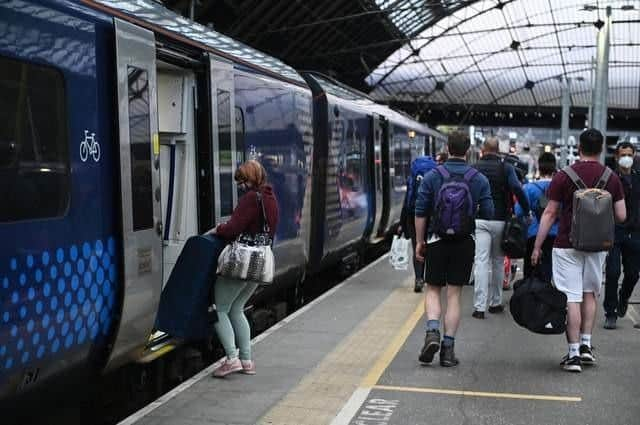ScotRail alcohol ban is increasingly difficult to justify – Martyn McLaughlin
Unsurprisingly, the Edinburgh Fringe features prominently in his packed itinerary, and I have been doing the best I can to recommend as many shows, pubs, and curios as possible, while also imploring him not to schedule every last minute. The highlight of August in Edinburgh is always wandering the streets and soaking in the atmosphere.
But with such counsel, there have come warnings. “Remember that when you’re getting the train there and back, you can’t drink alcohol,” I said. Laughter followed. “No, I’m serious, it’s banned.” More laughter, a little less certain, then a bemused silence. The penny dropped.
Advertisement
Hide AdAdvertisement
Hide AdMy friend is a fortysomething, university-educated professional who has spent the entirety of his career in US politics. All but the last factor should grant him automatic qualification as a grown-up, and yet he, like thousands of other passengers travelling through from Glasgow every day, must contend with a ban which is increasingly difficult to justify.


The measure was introduced in November 2020 at a time when widespread restrictions were in place to try and minimise the spread of Covid. Having reasoned that intoxicated passengers would be less able, and even less inclined, to wear face coverings or follow social distancing rules, a blanket ban was rolled out as a precautionary step.
“We want to do everything we can to support the public health measures put in place by the Scottish Government,” ScotRail explained. Now, nearly 21 months on, and three months after Scotland moved into the phase of "living with Covid”, the temporary ban remains in force, with no timescale to indicate when, or if, it might end.
David Simpson, the publicly owned rail operator’s service delivery director, said the ban had been “successful, particularly in containing some of the antisocial behaviour alcohol could often generate on some services”.
He explained that the company’s stance on alcohol would be considered as part of a “national conversation” on rail services, and that it was “really keen” to hear what passengers think about the move.
If we dissect the ‘blue sky’ terminology, Mr Simpson’s remarks invite several questions. First up is the obvious issue of clarifying what exactly a “national conversation” entails, and who will be consulted, and when.
The transport minister, Jenny Gilruth, made reference to the need for a “national conversation” way back in February, and then said it would be delayed until after the local elections. The nation still awaits.
Secondly, and perhaps most pertinently, why is ScotRail assessing the effectiveness of the ban in terms of its impact on anti-social behaviour, when it was introduced to improve compliance with Covid public health measures?
Advertisement
Hide AdAdvertisement
Hide AdWith the third winter of the pandemic on the horizon, it is unlikely, though not impossible, that restrictions could be reintroduced to counter an expected surge in cases. Is it wise of the Scottish Government and its state-owned entities to undermine public health measures so blatantly, especially when the World Health Organisation has warned of the “worst-case scenario” in the form of a new, severe variant?
Last but not least, by what criteria has the ban been judged a success? There has been no analysis of its impact or proportionality, and in responses to freedom of information requests, ScotRail has said it did not take specialist advice before introducing it. This is, at best, a curious stance for a private company to take. Now that it is in public hands, the disregard for evidence-based policy is concerning.
In May, Niamh Fitzgerald, professor of alcohol policy at the University of Stirling, said there was no evidence that the ban was making a difference to antisocial behaviour on trains. This view is corroborated by statistics released at the most recent meeting of British Transport Police’s Scottish railways policing committee.
It found that compared to 2019/20, the number of anti-social behaviour incidents across the Scottish rail network was up 53 per cent in 2021/22. Not all of these incidents will have occurred on ScotRail services, but it is reasonable to presume that the vast majority did.
Could such a pronounced increase simply be down to increased vigilance? Maybe, but if so, you’d think ScotRail would be shouting from the rooftops about it. After all, it has had a rocky old start to life in the public sector.
A cursory look at other statistics appears to show progress of sorts. BTP’s latest annual statistical bulletin shows that across Scotland public disorder offences fell by 14.3 per cent between 2019/20 and 2020/21. An encouraging figure in isolation, for sure, but in a UK-context, it is the lowest decrease of any BTP division.
Of course, ScotRail has imposed similar restrictions around alcohol in the past. Prior to the latest ban, it operated a longstanding policy which prohibited the consumption of alcohol on trains after 9pm, with booze not sold on-board beyond 8.30pm. That measure was introduced in the summer of 2012. A year later, it emerged the number of alcohol-related crimes recorded on trains across Scotland had almost doubled.
All in all, the picture is patchy and indefinite, and it certainly does not amount to a body of evidence with which to support the continued blanket ban.
Advertisement
Hide AdAdvertisement
Hide AdDon’t get me wrong. Like anyone who has spent time traversing Scotland’s rail network, I have first-hand experience of the kind of bevvy-fuelled anti-social behaviour which renders life a misery for the majority of passengers.
For years, I commuted up and down the main Ayrshire and Inverclyde routes, where boozy flashpoints were all too frequent. Anyone who has boarded the Ayr train from Glasgow Central on the morning of the Scottish Grand National will know that it makes the Feast of Bacchus look like afternoon tea at Jenners.
But addressing such stubborn and deep-rooted problems demands a considered approach. It undoubtedly requires better than policy-making by hunch.
Comments
Want to join the conversation? Please or to comment on this article.
